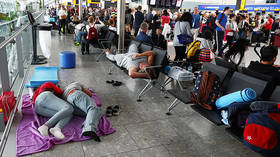Air travel is horrible & it’s a miracle more passengers don’t go on rampages

The price of flying somewhere new is often too much for any sane individual to tolerate. We’re shepherded around airports like cattle and forced to spend money to distract ourselves from boredom. Little wonder so many of us snap.
Case in point: a tourist went on a “rampage” at Moscow’s Sheremetyevo Airport last week, kicking rope barriers, banging on a locked runway door and trying to destroy computer terminals. He’d missed his flight, reportedly because he’d been busy drinking at a lounge bar. But rather than serving as a warning against alcohol, the episode is also an indictment of modern-day air travel, since the Sheremetyevo ‘rampage’ man is far from being the only person to have succumbed to air rage in recent months and years.
In fact, air rage is all-too common, whether we’re talking about Russia, the US, UK, Spain or China. And to be fair, while offenders are quickly and mercilessly detained by on-site authorities, it’s really difficult not to sympathise with all but the most violent of them.
Also on rt.com Russian man forgets to check in his gun & brings it on plane unhinderedWhy? Because air travel is horrible. Quite apart from the obvious psychological stresses of sitting in a glorified tin can at 30,000 feet (hence why some people feel the irresistible urge to liquor up beforehand), the whole process of air travel is excruciating from beginning to end. If ever the aviation industry wanted to design the perfect system for discouraging people from flying more frequently, they’d be hard pressed to improve on what they already have.
Where to start with how torturous air travel is? The first problem is that you already have to travel to the airport, which can take anything from one to two hours for most people, meaning that most of us have already had our fill of tourism before we’ve even arrived at our departure gates.
Not only that, but if you’re anything like the family of six who missed their flight to Milan in August because of a bus delay, you may find that slow public transport or a traffic jam makes catching your flight very, very difficult. And it’s easy to imagine how turning up at your airport an hour or so late makes air rage all the more likely. Just picture the scene: you’re already tense, anxious and irritable, but now you have to race through an airport full of oblivious, fast-food-munching troglodytes who have no awareness of your predicament and are possibly even struggling with their own races against time. When an accidental shoulder barge or a closed departure gate is thrown into this explosive mix, it’s once again little wonder that so many of us behave in a less-than dignified way.
Getting to the airport or your gate is one thing, but then you have to wait around for your flight. In anything from a 10th to a quarter of cases (depending on where you are in the world) this mind-numbing process can be extended as a result of delays or cancellations, pushing it beyond the realms of human endurance.
Also on rt.com 2 passengers in critical condition after commercial plane nearly crashes into water on remote Alaska island (PHOTOS)And make no mistake, waiting around at an airport is quite possibly the closest we human beings ever come to Hell on Earth, outside of conflict zones and other death-related contexts. Imagine an antiseptic, barren and lifeless environment where the only two activities available to you are shopping and visiting the toilet, and where you’re corralled through security gates and barriers under the implied suspicion that you might be a terrorist.
To be fair, this is an almost perfect metaphor for living in most developed nations today. And perhaps this is part of the reason why spending any appreciable length of time in an airport is enough to push even the most self-controlled of individuals to breaking point. That is, we go to an airport hoping for an escape from the tedium of being an employee and a political subject, but instead we’re confronted with a galling distillation of virtually everything that makes modern life awful. The queues, the anonymisation and depersonalisation, the wall-to-wall consumerism, the overbearing security, the lingering threat of terrorism or violence, and the increasingly strong suspicion that we’ve been lied to, in this case about the joys of travel.
Yet the stresses of air travel don’t end there, because with its increasing commercialization, the whole process of flying is becoming even more painful. As budget airlines become more dominant and flights become cheaper, more and more people pile into airports. Inevitably, passenger numbers have hit all-time highs, making airports even more insufferable than they already were. We struggle to find seats at terminals and departure gates, we struggle to jostle our way from one end of an airport to another, while seat sizes have shrunk so that planes can squeeze in more of us.
Also on rt.com ‘Shambolic’: Passengers outraged as Ryanair ‘systems failure’ spawns travel chaosIt’s therefore no surprise that incidents of air rage are increasing, and figures indicate it’s a long-term trend.
With air traveller numbers expected to double to 8.2 billion by 2037, this concerted amplification of agony and strain is only going to get much, much worse. Indeed, the fact the travel industry occasionally ranks airports according to which are most stressful indicates that it’s well aware of the problem, yet there’s no indication or realistic expectation that passenger numbers are going to decrease in the future. If anything, they’ll continue rising, and so too will the number of air rage incidents.
Simon Chandler, a London-based journalist focusing on politics and technology
Like this story? Share it with a friend!
The statements, views and opinions expressed in this column are solely those of the author and do not necessarily represent those of RT.













